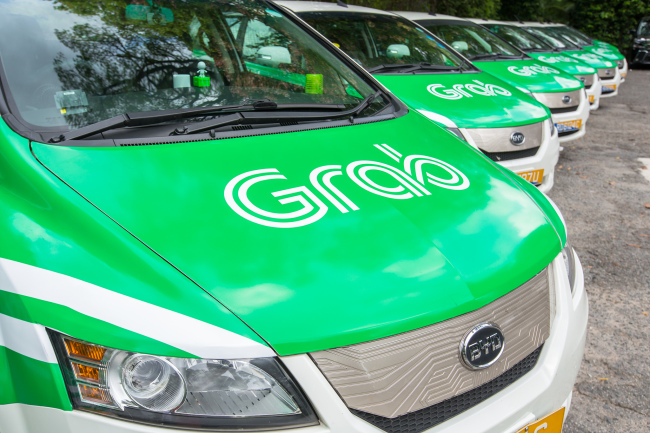[From the Scene] Ride-hailing giant Grab joins hands with SK for lead in future mobility
By Sohn Ji-youngPublished : June 11, 2018 - 16:01
SINGAPORE — In Singapore, you will most likely spot green-colored vehicles or motorbikes roaming the streets in every part of the city. Though they may be an unfamiliar sight to foreign tourists, they’re a part of the everyday mobility scene in the city-state as well as most parts of Southeast Asia.
Meet Grab, the largest ride-hailing app in Southeast Asia. Based in Singapore, Grab’s fleet of private vehicles, taxis and motorbikes currently dominates the ride-hailing market in eight countries including Singapore, Indonesia, Malaysia, the Philippines, Cambodia, Thailand, Myanmar and Vietnam.
Using the Grab mobile app, people can call up rides — with a diversity of options ranging from private vehicles, commercial taxis and motorbikes to suit one’s circumstances and mobility needs — at a price fixed on the app.

The startup was founded in 2012 by Malaysia natives and Harvard Business School classmates Anthony Tan and Hooi Ling Tan, with aims to launch a smart ride service that best caters to local mobility needs in Southeast Asia’s heavily-crowded cities.
Six years in, Grab is set to record over $1 billion in annual revenue this year and is currently valued at up to $10 billion by global investors. With 2.2 million registered drivers and around 20 million users worldwide as of end-2017, Grab is the third-largest in the world in terms of ride-hailing volume.
Most recently, the Singapore-based ride-hailing firm cemented its regional dominance by acquiring US-based Uber’s Southeast Asia operations, in exchange for Uber taking a 27.5 percent stake in Grab, marking the biggest deal of its kind to date in the region.
Over the years, Grab’s strengths and future potential has captured the attention of major corporations worldwide, leading to major investment deals. And South Korea’s top conglomerates have been no exception, having recently stepped up as strategic investors to the Singapore-based mobility firm.
With Grab, SK bets big on future mobility
The biggest investment in Grab from Korea has come from SK Holdings, the parent company of the telecom-to-energy conglomerate SK Group, which has set future mobility as a new growth engine to benefit its existing businesses.
In March, SK participated as a strategic investor in Grab’s latest $ 2 billion funding round, alongside the startup’s existing key shareholders including Japan’s Softbank and China’s Didi Chuxing.
The Korean conglomerate has disclosed that it invested 81 billion won ($75.38 million) toward acquiring a 1.32 percent stake in Grab. As a strategic investor, SK’s role will go beyond a financier to a technology provider able to offer critical technology assistance to the Singapore-based startup, it said.
For this reason, SK Holdings currently holds “observer” status on Grab’s board, despite possessing a relatively small stake in the Southeast Asian mobility startup compared to other foreign investors.
The SK-Grab partnership will revolve around electric vehicles, map technologies for autonomous vehicles and more, with room for expanded cooperation. While the possibilities are broad, the starting points will all be rooted in “future mobility,” says Grab’s co-founder and Chief Operating Officer Tan Hooi Ling.

“With SK, we’re focused on what future mobility looks like. We have a partnership on the EV side, and SK also has many technological innovations like mapping that we have much to learn from,” Tan told the Korean press during a meeting at Grab’s headquarters in Singapore last week.
This could mean supplying SK Telecom’s high-definition mapping technologies, SK C&C’s IT solutions and SK Innovation’s EV batteries to Grab as it improves and expands the scope of its mobility business, according to SK Holdings.
The details of the technological cooperation will become clearer as Grab’s business further develops over the years, the COO said, noting that “We like to keep our projects open to create and execute on different ideas.”
Grab 2.0: all-in-one mobility platform
Backed by funding from Asia’s biggest companies and a solid grip on Southeast Asia’s ride-hailing market, Grab is now in the process of taking its ride-hailing business to the next level, Tan explained.
The ultimate goal is to transform Grab into an “everyday app” that serves broader transportation needs in Southeast Asia as well as offers easy mobile payments and finance services to users.
On the mobility side, Grab wants to move beyond taxis, cars and bikes to become a more integrated mobility platform that is used from the moment one steps out of the house to the moment of arrival at one’s final destination.
“What does it mean to be a ‘one-stop mobility platform’? It means individuals don’t need to own cars. Mobility services become so widespread so that no one needs to own a car,” said Xin Wei Ngiam, Head of Shared Mobility at Grab.
In Southeast Asia, traveling by multiple modes of transportation, usually 3-4 types, is very common. For example, you might ride a bike to the bus station, ride the bus, and then ride a bike again to your office. And the entire process could take hours, given unpredictable waiting times.
Considering this, Grab envisions a future where all these modes of transportation can be booked on a concrete time schedule and paid for in advance at once via the Grab app. This would allow the firm to tap into new demographics who do not want the relatively more expensive taxis or personal rides.
Looking ahead, Grab is also closely eyeing new mobility trends including the electrification of transport, autonomous mobility and the rise of personal mobility devices like electric scooters, Ngiam said. And it’s on this end that partners like SK are expected to pitch in their technological expertise.
Leveraging Grab influence, the app operator is also working diligently to expand its mobile payment service GrabPay, with aims to transform Southeast Asia -- where only 1 in 4 possesses a bank account, and 1 in 10 own a credit card -- into a cashless society, said Tan.
It also wants to provide micro-financing services to Grab drivers who have shown a strong work track record, enabling the “invisible” populations previously marginalized by the bank-led offline finance sector, to obtain the money they need to improve their lives, the COO said.
Additional services include the continued expansion of GrabFood — the food delivery service launched after acquiring UberEats — and the successful operation of GrabVentures, a startup acceleration and investment unit newly launched just last week.
By Sohn Ji-young, Korea Herald correspondent (jys@heraldcorp.com)



![[AtoZ into Korean mind] Humor in Korea: Navigating the line between what's funny and not](http://res.heraldm.com/phpwas/restmb_idxmake.php?idx=644&simg=/content/image/2024/04/22/20240422050642_0.jpg&u=)
![[Exclusive] Korean military set to ban iPhones over 'security' concerns](http://res.heraldm.com/phpwas/restmb_idxmake.php?idx=644&simg=/content/image/2024/04/23/20240423050599_0.jpg&u=20240423183955)



![[Graphic News] 77% of young Koreans still financially dependent](http://res.heraldm.com/phpwas/restmb_idxmake.php?idx=644&simg=/content/image/2024/04/22/20240422050762_0.gif&u=)

![[Herald Interview] Why Toss invited hackers to penetrate its system](http://res.heraldm.com/phpwas/restmb_idxmake.php?idx=644&simg=/content/image/2024/04/22/20240422050569_0.jpg&u=20240422150649)




![[Exclusive] Korean military to ban iPhones over security issues](http://res.heraldm.com/phpwas/restmb_idxmake.php?idx=652&simg=/content/image/2024/04/23/20240423050599_0.jpg&u=20240423183955)



![[Today’s K-pop] Ateez confirms US tour details](http://res.heraldm.com/phpwas/restmb_idxmake.php?idx=642&simg=/content/image/2024/04/23/20240423050700_0.jpg&u=)